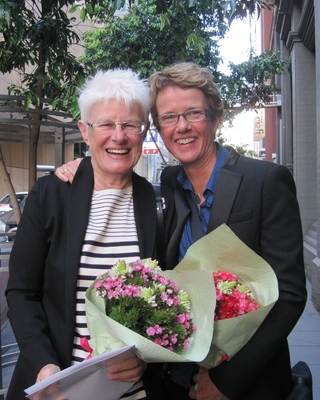
By Luke Voogt
Geelong same-sex couples who married overseas hope a ‘Yes’ vote will grant them the same rights as married heterosexual couples – like divorce and superannuation access.
A Geelong woman who married in the Netherlands was unable to get a divorce due to Australia not recognising her marriage.
The woman, who wished to remain anonymous to keep her “private life out of the paper”, had since separated from her spouse and found another partner.
The woman just wanted to “move on” with her life but would have to travel to the Netherlands to get a divorce, she said.
Another lesbian who married overseas, Priscilla Pyett, said Australia had led the developed world in same-sex relationship laws when she wed Geelong-born partner Meg Mappin.
“Now Australia’s fallen behind and it’s looking pretty silly.”
The couple of 24 years first noticed the difference in how Australia and other countries treated de facto relationships when they travelled in 2010.
Some countries would not recognise Priscilla and Meg, who live in Anglesea for a third of the year, as a couple.
“We knew we were in a situation where if one of us were hospitalised we wouldn’t be recognised a couple,” Priscilla said.
“That was quite frightening – to realise we wouldn’t be recognised as next of kin for each other. That’s when we thought marriage was the answer.”
So the couple had a civil union in the British Consulate in 2013 to travel the country as a recognised couple.
“(The consulate staff) were lovely,” Priscilla said.
“When Britain brought in the legislation for same-sex marriage (in 2014) it was just a matter of paperwork to upgrade it.”
But with a number of countries legalising same-sex marriage, Australia was now lagging behind, she said.
“That marriage carries everywhere except Australia,” she said.
Priscilla was disappointed the Federal Government had yet to update the law to recognise her marriage, denying her the same rights as married couples.
“I’m not interested in any other form of recognition, because only marriage is recognised pretty much worldwide.”
In Victoria same-sex couples in “registered relationships”, commonly referred to as civil unions, have a degree of legal protections.
But Federal law requires further proofs of relationship in many matters, meaning same-sex couples often have fewer rights with issues such as superannuation or death certificates.
The Indy also is aware of an American expat living with her partner in Geelong, who married in California.
“I have some friends who have been married overseas in Canada too,” Priscilla said.
“They couldn’t have their friends and family there and that’s really sad.”
Geelong same-sex campaigner Sharon Faulkner was reasonably confident this week the ‘Yes’ vote would “get across”.
The $122 million same-sex marriage survey closed on Tuesday with an estimated 12.6 million or 78.5 per cent of Australians voting.
ABC polling of Corangamite and Corio showed about 67 per cent of voters supported same-sex marriage.






